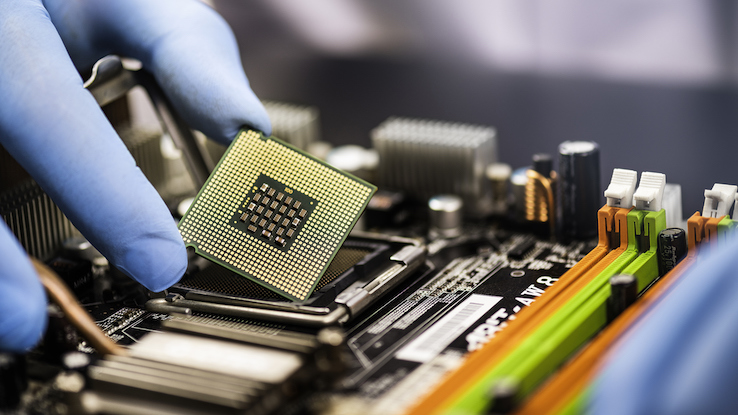
While mega cellular network providers such as Verizon and T-Mobile are at the forefront in terms of 5G network performance, integration and speed, a lot happens behind the scenes to make the entire 5G connectivity system run smoothly. Dozens of different electronic components are involved in accessing and maintaining this connectivity in mobile devices and their respective companies are poised to grow as 5G networks become more widespread.
For this reason, you may want to boost your portfolio by opting to invest in one of these smaller component-supplier companies, such as NXP, which makes chips for smartphones, or Corning, which makes fiber optic cables to transport signals, along with small-cell antennas to boost 5G networks. Learn more about the potential benefits associated with investing in stocks from these and other 5G-adjacent tech companies.
Qualcomm Inc (QCOM)
Not only has Qualcomm historically played an important role in providing the necessary technology for 3G and 4G mobile networks, but it has also built up a broad portfolio and is set to benefit in several ways with the expansion of 5G networks. For example, the company has created chips for smartphones, cars and various “Internet of Things” devices, and as their use becomes more widespread, demand for the tech should increase. Qualcomm also develops and provides mobile application processors and software for mobile devices and 5G wireless networks.

Another area where Qualcomm has positioned itself for success as 5G networks expand is in enabling mobile devices to seamlessly switch between 4G and 5G networks and Wi-Fi connections. Not only does this allow users to access 5G networks whenever they’re available, but it also ensures a higher likelihood of dependable coverage if a 5G signal isn’t currently available.
NXP Semiconductors NV (NXPI)
In the automotive world, NXP stands out as the largest chip supplier for devices like infotainment systems and battery-management modules in electric cars. After a tumultuous year in 2018, including Qualcomm’s failure to purchase the company, NXP rallied in 2019 and purchased Marvell Technology’s Wi-Fi and Bluetooth connectivity chip business.

One area where NXP really shines is within the ultra-wideband chip market. Compared with Bluetooth, this tech pinpoints the exact location of the device it’s communicating with, which makes it a more efficient and secure alternative to Bluetooth. An increasing number of these chips are finding their way into smartphones.
American Tower Corp (AMT)
American Tower is a real estate investment trust that owns and operates cell tower sites and buildings that support internet infrastructure and mobile networks. It’s hard to properly broadcast 5G signals without real estate on which to build reception towers, which is where American Tower comes into play. The company specializes in constructing and managing neutral-host wireless networks, with an emphasis on building these networks while working with property owners to avoid intruding on their space.

In an interview with CNBC, former American Tower CEO Jim Taiclet explained that, in the future, cell tower sites will need to be closer together to provide uninterrupted 5G signals. He anticipates that this extra coverage, with more equipment needed for support and higher transmission rates, will help lengthen and strengthen the company’s growth rate, both domestically and eventually around the world.
Corning Inc. (GLW)
5G data requires a wired broadband network that connects facilities before it switches into a high-speed Wi-Fi signal for transmission, and Corning produces the fiber optic cable that makes this happen. In October 2019, Corning announced a collaborative effort with Intel (INTL) to boost 5G availability in buildings by providing a virtual platform for Corning’s 5G network solutions using Intel Xeon Scalable processors and Intel FlexRAM Reference Software Architecture.

According to The Motley Fool, Corning is also venturing into the small-cell antenna realm and is working with Qualcomm (QCOM) to produce the in-building network equipment that can keep 5G signals from penetrating solid surfaces. A blend of consistent performance and innovation makes Corning a solid pick for a 5G stock, and its longstanding dividend payment history doesn’t hurt.
Apple (AAPL)
It’s no secret that Apple dominates the market when it comes to smartphones. Apple isn’t known as the most innovative company on the market when it comes to radio technology, and it generally waits until the early kinks are worked out before rolling out devices for the masses. For example, its iPhone 5, the company’s first LTE phone, arrived two years after Verizon first began to offer LTE connectivity.

As part of its initial 5G lineup, Apple introduced four iPhone models that can connect to the speedier network. If consumers rush to purchase these updated models upon release, it may result in a surge in Apple stock prices.





